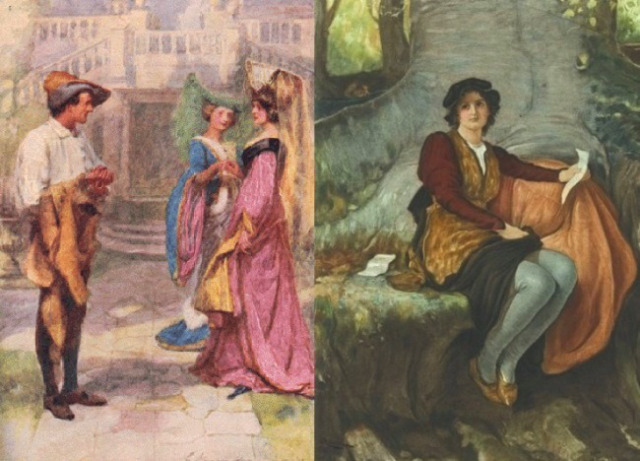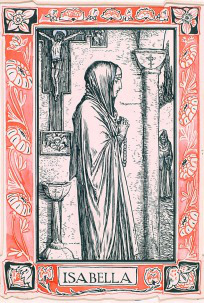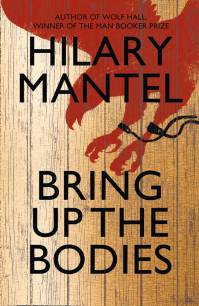
________________________________________________________________
Welcome to The Coffee Shop, just for you early risers on Monday mornings. This is an Open Thread forum, so if you have an off-topic opinion burning a hole in your brainpan, feel free to add a comment.__________________________________________________________
“Brush up your Shakespeare, start quoting him now…” — from Kiss Me Kate

________________________________________________________________
________________________________________________________________
April Musing, the Third: This is the third week of my annual musings on Shakespeare. It continues my mission from last week: to show that the 400-year-old words of William Shakespeare are very relevant to the 21st Century.
NOTE: I marked the portions of the speeches which are in bold, to emphasize the points being made.
For those of you who are asking THE question about Pericles, Prince of Tyre: Is it Shakespeare?
It wasn’t in the First Folio, which must give us pause. BUT – some lines sing, seemingly in Shakespeare’s key.
The balance of current scholarly thinking is that roughly half of the play’s lines were probably penned by William Shakespeare. So I’ve opted to use a couple of brief quotes from the play that suit our theme well. I have to say, overall the play lacks Shakespeare’s deftness and subtlety, and the plot is a real clunker.
I knew him tyrannous, and tyrants’ fears
Decrease not, but grow faster than the years. Tis time to fear when tyrants seem to kiss. — Pericles, Act I, scene ii
We left off with Julius Caesar last week. Next up in the probable order of performance is As You Like It, and Duke Frederick certainly qualifies as a tyrant. He has usurped power and banished his brother, the rightful Duke.
LEBEAU
But I can tell you that of late this duke
Hath ta’en displeasure ‘gainst his gentle niece,
Grounded upon no other argument
But that the people praise her for her virtues
And pity her for her good father’s sake;
And, on my life, his malice ‘gainst the lady
Will suddenly break forth.— As You Like It, Act I, scene ii
Now, as Lebeau predicted, Frederick banishes his niece Rosalind:
DUKE FREDERICK
. ROSALIND
Mistress, dispatch you with your safest haste,
And get you from our court.
Me, uncle? . DUKE FREDERICK
You, cousin.
Within these ten days if that thou be’est found
So near our public court as twenty miles,
Thou diest for it. . ROSALIND
I do beseech your Grace,
Let me the knowledge of my fault bear with me.
If with myself I hold intelligence
Or have acquaintance with mine own desires,
If that I do not dream or be not frantic—
As I do trust I am not—then, dear uncle,
Never so much as in a thought unborn
Did I offend your Highness. . DUKE FREDERICK
Thus do all traitors. If their purgation did consist in words, They are as innocent as grace itself. Let it suffice thee that I trust thee not. . ROSALIND
Yet your mistrust cannot make me a traitor. Tell me whereon the likelihood depends. . DUKE FREDERICK
Thou art thy father’s daughter. There’s enough.
 Left: Orlando, Celia and Rosalind, by Gertrude Demain Hammond
Right: Rosalind, by Robert Walker Macbeth
Left: Orlando, Celia and Rosalind, by Gertrude Demain Hammond
Right: Rosalind, by Robert Walker Macbeth
But unlike real-life tyrants, at the end of this comedy, Frederick, searching the Forest of Arden for his exiled brother so he can kill him, is suddenly converted by a hermit, and gives up his power to retire from the world. An unlikely scenario, but the whole play is already so full of unlikely things, like palm trees, a lion and even a Greek god pulling a deus ex machina to straighten out the tangled plot, allowing Rosalind to shed her boyish garb, and reveal her secret to Orlando, just in time for the wedding.
As You Like It – in German
________________________________________________________________
In Hamlet, the new King has killed his brother to gain the crown, then married his sister-in-law to cement his power, although he seems to be at least in lust with Gertrude. Nobody’s saying anything about it except Hamlet, who is really upset that his father is dead, and his mother has remarried so quickly. Then his friends tell him his father’s ghost is walking up on the battlements, so he goes to see for himself, and his father’s ghost says Claudius murdered him:
KING HAMLET’S GHOST
If thou didst ever thy dear father love
Revenge his foul and most unnatural murder…
The serpent that did sting thy father’s life
Now wears his crown…
Ay, that incestuous, that adulterate beast,
With witchcraft of his wit, with traitorous gifts,—
O wicked wit and gifts, that have the power
So to seduce!–won to his shameful lust
The will of my most seeming-virtuous queen…— Hamlet, Act I, scene v
Hamlet fears that his mind may be betraying him, and does a lot of hand-wringing about seeking revenge by killing his uncle — or not. He wants proof of his uncle’s treachery before making a move. He decides to use the traveling players who just arrived at Elsinore:
HAMLET
…The play’s the thing
Wherein I’ll catch the conscience of the king.— Hamlet, Act 2, scene ii
He re-writes part of their play, The Murder of Gonzago, to make the details fit with how the Ghost told him he was murdered, but Hamlet is still tormented by doubt. He considers suicide, in one of the most famous speeches in the English language:
HAMLET
To be, or not to be — that is the question:
Whether ’tis nobler in the mind to suffer
The slings and arrows of outrageous fortune
Or to take arms against a sea of troubles,
And by opposing end them. To die — to sleep —
No more; and by a sleep to say we end
The heartache, and the thousand natural shocks
That flesh is heir to. ‘Tis a consummation
Devoutly to be wish’d. To die — to sleep.
To sleep — perchance to dream: ay, there’s the rub!
For in that sleep of death what dreams may come
When we have shuffled off this mortal coil,
Must give us pause. There’s the respect
That makes calamity of so long life.
For who would bear the whips and scorns of time,
Th’ oppressor’s wrong, the proud man’s contumely,
The pangs of despis’d love, the law’s delay,
The insolence of office, and the spurns
That patient merit of th’ unworthy takes,
When he himself might his quietus make
With a bare bodkin? Who would these fardels bear,
To grunt and sweat under a weary life,
But that the dread of something after death —
The undiscover’d country, from whose bourn
No traveller returns — puzzles the will,
And makes us rather bear those ills we have
Than fly to others that we know not of?
Thus conscience does make cowards of us all,
And thus the native hue of resolution
Is sicklied o’er with the pale cast of thought,
And enterprises of great pith and moment
With this regard their currents turn awry
And lose the name of action. — Soft you now!
The fair Ophelia! — Nymph, in thy orisons
Be all my sins rememb’red.— Hamlet,Act 3, scene i
Shakespeare’s description of why it takes so much time for thoughtful people to act is very relevant to our present-day troubles.
The revised version of Gonzago succeeds in completely unnerving the King. Claudius’ next move is to enlist Rosenkrantz and Guildenstern to help him do away with Hamlet, covering the first assassination with another murder.
Hamlet overhears his uncle admit his sins in prayer. But what Claudius is really wrestling with is how to be forgiven, but without giving up any of the benefits of his crimes:
Shakespeare shows us that even when the tyrant has some bit of conscience, it is overridden by his unwillingness to give up power, and he will try to whine his way out of responsibility for his acts, compounding his crimes to save himself from their ever-deepening consequences.
When the plot fails that Claudius contrived to have Hamlet killed safely away from the Danish court so his own part will not be suspected, he works on the crazed grief of Laertes, whose father died when Hamlet, thinking Claudius is the eavesdropper hiding behind a curtain, stabs him. Now Ophelia, his sister, has been driven mad by the loss of Hamlet’s love and the murder of their father. Claudius points Laertes at Hamlet, suggesting a duel, where Laertes can use his superior swordsmanship to engineer an “accident.” When Gertrude arrives with the news that Ophelia has drowned herself, Laertes feels he has lost everything.
The last scene is a bloodbath. Laertes cuts Hamlet with his poisoned blade; the Queen drinks the poisoned cup that Claudius planned for Hamlet to drink, to be sure of his death, she dies; Hamlet uses Laertes’ own sword to cut him; Laertes tells Hamlet what’s happening and dies; Hamlet turns the poisoned blade on Claudius, then makes Claudius drink the last of his own poison, and he dies. Only Hamlet’s friend Horatio is left standing, ready to follow him into death, but Hamlet asks him to live so he can tell the story. Hamlet’s dying words, before a final cry of pain are “The rest is silence,” but that isn’t quite the end of the play. Fortinbras conveniently arrives, and stakes his claim to the empty throne. Life goes on.
IF YOU’VE NEVER SEEN THE CANADIAN TV MINI-SERIES SLINGS AND ARROWS, ABOUT THE LIFE AND TIMES OF A SHAKESPEARE FESTIVAL — HIGHLY RECOMMENDED!
________________________________________________________________
I’ll skip over Twelfth Night and Troilus and Cressida, so we now arrive at Measure for Measure, a problematic, uneven play, classified as a comedy only because of its contrived happy ending, but full of wonderful speeches about tyranny. The setting is nominally Vienna. Vincentio, the Duke of Vienna, announces his plans to leave the city, entrusting the government to his two deputies, the old Lord Escalus and the young ambitious Angelo, who sees the city as riddled with vice, and is itching to crack down on all the transgressors, however large or small their crimes.
Claudio has been courting the girl he wants to marry, but negotiations have stalled over the dowry, and the impatient young man has dallied with his girlfriend, and now she’s pregnant. On the law books, this is a crime punishable by death, but it hasn’t been enforced for some time, and Claudio is horrified when Angelo condemns him to death, the sentence to be carried out in only three days.
Claudio’s sister, Isabella, a rigidly upright young woman planning on becoming a nun, sees everything as black or white, and believes her brother has committed a grave sin, even though most of the other citizens consider a pre-contract for marriage just as binding as marriage. But she loves her brother dearly, in spite of his free and easy ways, and reluctantly agrees to plead with Angelo for his life.

Isabella from Measure for Measure – drawing and Lily Brayton 1907 (right)
Angelo is equally rigid, and has been for a longer time than Isabella, so he ignores the advice of his fellow deputy, and continues to give out maximum sentences, determined to sweep Vienna clean of all vice.
Isabella arrives, escorted by Claudio’s friend Lucio, and is admitted to see Angelo,
but is so uncomfortable that her arguments are failing —
ISABELLA
There is a vice that most I do abhor,
And most desire should meet the blow of justice;
For which I would not plead, but that I must . . .— Measure for Measure, Act II, scene ii
Angelo tells her it is too late, Claudio is already condemned. (Lucio reproaches her: “You are too cold.”)
ISABELLA
Too late? why, no; I, that do speak a word.
May call it back again, Well, believe this,
king’s crown, nor the deputed sword,
The marshal’s truncheon, nor the judge’s robe,
Become them with one half so good a grace
As mercy does.
If he had been as you and you as he,
You would have slipt like him; but he, like you,
Would not have been so stern.— Measure for Measure, Act II, scene ii

Sarah Siddons (left) as Isabella, and painting by Francis William Topham
As she gets caught up in her argument, she becomes much more passionate:
ISABELLA
Could great men thunder
As Jove himself does, Jove would ne’er be quiet,
For every pelting, petty officer
Would use his heaven for thunder;
Nothing but thunder! Merciful Heaven,
Thou rather with thy sharp and sulphurous bolt
Split’st the unwedgeable and gnarled oak
Than the soft myrtle: but man, proud man,
Drest in a little brief authority,
Most ignorant of what he’s most assured,
His glassy essence, like an angry ape,
Plays such fantastic tricks before high heaven
As make the angels weep; who, with our spleens,
Would all themselves laugh mortal.
Because authority,though it err like others,
Hath yet a kind of medicine in itself,
That skins the vice o’ the top. Go to your bosom;
Knock there, and ask your heart what it doth know
That’s like my brother’s fault: if it confess
A natural guiltiness such as is his,
Let it not sound a thought upon your tongue
Against my brother’s life.— Measure for Measure, Act II, scene ii
Angelo remains adamant. She begs him to show some pity, but he replies
ANGELO
I show it most of all when I show justice;
For then I pity those I do not know,
Which a dismiss’d offence would after gall;
And do him right that, answering one foul wrong,
Lives not to act another. Be satisfied;
Your brother dies to-morrow; be content.— Measure for Measure, Act II, scene ii
Isabella is not content with this at all.
ISABELLA
O, it is excellent
To have a giant’s strength; but it is tyrannous
To use it like a giant.— Measure for Measure, Act II, scene ii
Abruptly, Angelo wavers.
ANGELO
I will bethink me: come again tomorrow.
— Measure for Measure, Act II, scene ii
Isabella says she will bribe him — he is shocked, but she explains:
ISABELLA
Not with fond shekels of the tested gold,
Or stones whose rates are either rich or poor
As fancy values them; but with true prayers
That shall be up at heaven and enter there
Ere sun-rise, prayers from preserved souls,
From fasting maids whose minds are dedicate
To nothing temporal.— Measure for Measure, Act II, scene ii

Isabella by uncredited artist
_____________________________________
fter Isabella leaves, Angelo reveals that he has fallen for her, but this isn’t love at first sight. He lusts for her, so aflame he’s willing to blackmail her into his bed in exchange for releasing her brother, a far worse crime than going to bed with a willing fiancée. He even tries to blame his lust on her, but then admits to himself that she wasn’t trying to tempt him. But he reveals his contempt for all women — they are only chaste or whores, as men would make them. His “love” is as false as his shattered morality.
ANGELO
From thee, even from thy virtue!
What’s this, what’s this? Is this her fault or mine?
The tempter or the tempted, who sins most?
Ha!
Not she: nor doth she tempt: but it is I
That, lying by the violet in the sun,
Do as the carrion does, not as the flower,
Corrupt with virtuous season. Can it be
That modesty may more betray our sense
Than woman’s lightness? Having waste ground enough,
Shall we desire to raze the sanctuary
And pitch our evils there? O, fie, fie, fie!
And What dost thou, or what art thou, Angelo?
Dost thou desire her foully for those things
That make her good? O, let her brother live!
Thieves for their robbery have authority
When judges steal themselves. What, do I love her,
That I desire to hear her speak again,
And feast upon her eyes? What is’t I dream on?
O cunning enemy, that, to catch a saint,
With saints dost bait thy hook! Most dangerous
Is that temptation that doth goad us on
To sin in loving virtue: never could the strumpet,
With all her double vigour, art and nature,
Once stir my temper; but this virtuous maid
Subdues me quite. Even till now,
When men were fond, I smiled and wonder’d how.— Measure for Measure,Act II, scene ii
________________________________________________________________
Which one will bend? Will Claudio live? Does Shakespeare have a wild card up his sleeve?
Well, tune in next Monday, April 24, for the third and final part of TCS: ‘I knew him tyrannous’ – Will Shakespeare on TYRANNY________________________________________________________________
Today is White House Lawn Easter Egg Rolling Day, a 139-year tradition — rumor has it that Occupant and his minions are ill-prepared, and Melania and the Easter Bunny have been AWOL during planning
G’Morning! Share this:- More






